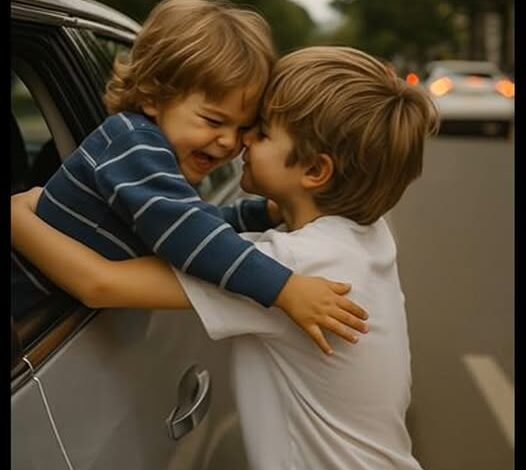An eight-year-old boy saved a child from a locked car, causing him to be late for class and get scolded – but soon something unexpected happened!

An eight-year-old boy ran down the street, his backpack bouncing against his shoulders. He was late again, and the thought of facing his math teacher made his stomach twist. She was strict, never sparing her sharp words when he slipped up. Being late always led to the same routine: the raised eyebrow, the cutting remark about laziness, and the humiliation of walking to his seat under the weight of everyone’s stares.
This morning had already been a mess. The elevator in his building wasn’t working, so he had to race down eight flights of stairs. Now, as he hurried across the street, he muttered under his breath, “She’s going to yell again. She’s going to say I’m lazy, that I don’t care.” He imagined her stern face, the disappointment, the same speech she gave every time.
But then, something stopped him cold.
A gray sedan was parked at the curb. Inside, in the passenger seat, a small child sat alone. The boy couldn’t have been more than three or four. His face was red, his tiny fists pounding desperately on the glass. Tears streamed down his cheeks as he screamed hoarsely, barely able to get the words out. His breathing was fast and uneven, the kind that came from panic and heat. The car windows were sealed tight, trapping him inside like an oven.
The eight-year-old froze, torn between two fears. One was his teacher, already counting the minutes until she scolded him again. The other was this child, whose face looked frighteningly like his younger brother’s when he cried. He thought of his brother locked in that car, suffocating, helpless, and felt a surge of dread.
“What if it were him? What if no one helped?”
Without letting himself hesitate further, he looked around, grabbed a jagged stone from the gutter, and struck the car window with all his strength. The first hit cracked the glass. The second shattered it completely. The alarm erupted in a deafening shriek, but he ignored it. He reached through the shards and unlocked the door, pulling the child carefully into his arms.
The boy was hot to the touch, his skin damp with sweat. He clung to his rescuer, still sobbing but breathing more evenly now that the suffocating heat was gone.
Moments later, a woman came sprinting down the sidewalk. Her hair was messy, her eyes wide with terror. When she saw her son in the boy’s arms, she nearly collapsed. She dropped to her knees, clutching her child tightly. “Oh my God… oh my God, thank you! Thank you!” she cried over and over.
The boy only nodded, wiping the sweat and dust from his hands onto his shirt. He didn’t feel like a hero. He just felt relief that the little boy was safe. Then he glanced at the time and sighed. He was even later now.
At school, the inevitable happened. The math teacher spotted him slipping into the classroom. Her voice cut through the air like a whip.
“Late again! How many times is this now? I’ve had enough! Tomorrow you’re coming here with your parents!”
The boy opened his mouth, the words on the tip of his tongue: I was saving a child. I couldn’t leave him. But his throat tightened. He couldn’t force it out. The shame of her anger weighed heavier than the truth he carried.
“I don’t care what you were doing,” she snapped. “Sit down.”
He slid into his seat, cheeks burning. His classmates snickered under their breath. His chest ached with frustration, but he told himself to endure it. The child was safe—that mattered more.
Then, something unexpected happened.
The classroom door swung open. Standing there was the woman from the street, her son still clinging to her side, and beside her was the school principal.
The room went silent. The woman’s voice rang clear. “This boy saved my son’s life today. He broke the window of a locked car and pulled him out. If he hadn’t been there, I don’t know what would have happened. I came to thank him in front of everyone—because not every child his age would have had that kind of courage.”
The class stared at the boy in disbelief. The teacher’s face went pale. She opened her mouth, then closed it again.
The principal stepped forward with a small box. “You did the right thing,” he said firmly, handing it to the boy. Inside was an e-book reader, a reward for his bravery. “We are proud of you.”
The boy’s eyes widened. He had never been praised in such a way. The teacher shifted awkwardly, then whispered, “I’m sorry… I didn’t know.”
For once, the boy didn’t feel small. He didn’t feel like a late, lazy student. He felt seen.
As he held the e-book in his hands, a quiet happiness spread through him. He realized something he’d never forget: the harshest words from adults mean nothing compared to the weight of doing what is right. Lessons could be repeated, grades could rise and fall—but saving a life was bigger than any exam.
And at just eight years old, he understood a truth most grown-ups often forget: sometimes the most important test isn’t on paper. It’s the one life hands you, when someone needs you most.